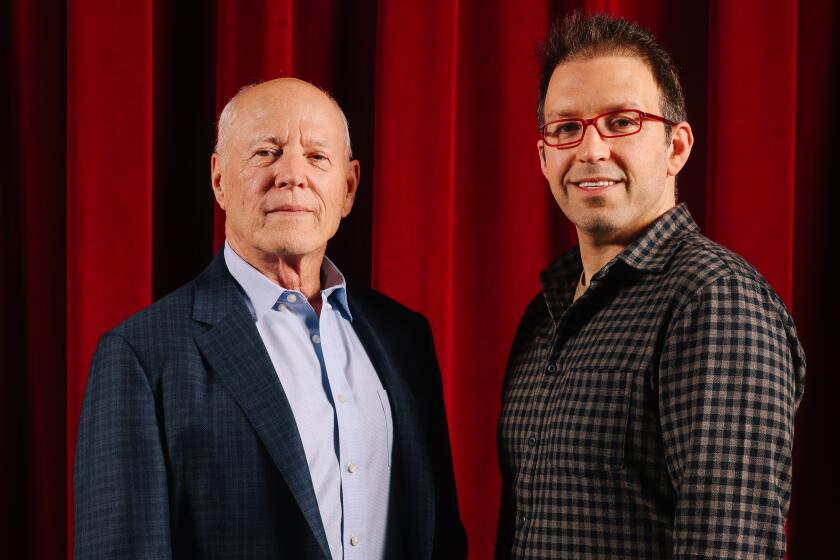This ‘Farewell’ is new yet familiar
Xiao Bai’s “Farewell My Concubine” is hybrid opera, and as with hybrids in nature, it is familiar yet exotic. The approach is, on the surface, a simple one. Xiao, who served as executive conductor of the Shanghai Opera House for 35 years, refashioned the story of a beloved traditional opera into a modern, more Westernized language.
“Concubine” was given its premiere by the China National Opera House in Beijing in October, and that production is now touring the United States. Over the weekend, it was presented at the Pasadena Civic Auditorium in two performances with two casts. The opera is said to be something new, and it is, but maybe not quite in the way intended. Xiao’s music relies on Verdi, Puccini, Leoncavallo and the like for its style, but “Concubine” is still unmistakably Chinese.
In fact, the opera felt more Chinese to this American listener than, say, the operas of Tan Dun and Bright Sheng, Chinese composers who moved to America and adapted modern Western musical techniques less as a way to bridge a gap than to consciously preserve their ethnicity.
“Concubine” really does try to be Western. Xiao knows what he is doing. He earnestly underscores action, although his methods are often as cinematic as they are operatic. I suspect he has learned a trick or two from Alex North and the way North scored “Spartacus” and “Cleopatra.” Xiao has a facility with melody. His harmonies never startle.
But lots of things give him away as a non-Western composer. His technique is a sort of reverse chinoiserie, in that he writes Western music but frames it in non-Western ways. Percussion acts as punctuation, serving more as wake-up call than accent or driving force. Xiao is skilled at building conventional climaxes typical of verismo opera, but he obviously enjoys announcing them as well. His orchestration is individual, often featuring solo instruments played in an ornamental Chinese manner.
The plot -- familiar to Chinese audiences and perhaps to Westerners who have seen the Chinese film of the same name -- revolves around an arrogant warrior’s development of compassion. In the first act, Xiang Yu is interested only in revenge. But by the end of the second act of the 90-minute score, Xiang has been persuaded to adopt a more noble and caring state of mind by his favorite concubine, Yu Ji. With defeat on the battlefield looming, both commit suicide rather than continue the suffering of further warfare.
The production seen Sunday afternoon was scenically crude, but the costumes were elaborate and beautiful. The singers operated somewhere that was neither West nor East. Sung in Mandarin (with Chinese and English supertitles), the opera asks for an Italianate vocal style, but Xiao’s sensitivity to language creates interesting accents.
The acting is also unconventional. By Western standards, the cast could appear overly grand and obvious, but Sunday’s performers often moved and used their hands in an elegant manner adapted from traditional Chinese opera.
Likewise, the director, Cao Qijing, blocks his production into formal set pieces, which in the West would be criticized as starchy stand-and-sing but here had a kind of ceremonial elegance.
Xiao doesn’t end with pathos, as Puccini certainly would have. When an opposing general but former friend of Xiang reaches the scene of the lovers’ deaths too late, he sobs pathetically. But a heroic chorus brings the curtain down praising Xiang and Yu, who sit up to bask in their glory.
For Sunday’s cast, Sun Li was a strong Xiang. Shen Na showed off her sparking top as Yu Ji, while Niu Shahsha, as her sister Yu Zhu, revealed a pleasingly bold alto. Jin Zhengjian was the earnest Han Xin, and Wang Haimin, as a fisherman, sang a traditional melody with strong feeling. Yu Feng conducted a smallish orchestra better in the solo moments than the massed ones.
In the lobby afterward, singers in full costume and makeup signed programs and DVDs and posed for photographs. That was one more marvelous non-Western touch.
More to Read
The biggest entertainment stories
Get our big stories about Hollywood, film, television, music, arts, culture and more right in your inbox as soon as they publish.
You may occasionally receive promotional content from the Los Angeles Times.







